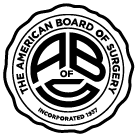American Board of Surgery

Surgery
Surgeons perform general surgeries, vascular surgeries, trauma surgeries, transplant surgeries, and more.
Surgeons use operative measures to treat disease, injuries, and disorders or repair tissues or organs. A general surgeon is also trained in the treatment of patients who are injured or critically ill, and in the care of pediatric and cancer patients. General surgeons are skilled in the use of minimally invasive techniques and endoscopies. Common conditions treated by general surgeons include hernias, gallstones, appendicitis, breast tumors, thyroid disorders, pancreatitis, bowel obstructions, colon inflammation, and colon cancer. Some general surgeons pursue additional training and specialize in the fields of Pediatric Surgery, Surgical Oncology, Vascular Surgery, Trauma Surgery, Hospice and Palliative Medicine, Transplant Surgery, and others.
Specialty Areas
Vascular Surgery
A vascular surgeon has expertise in the diagnosis and management of patients with disorders of the arterial, venous, and lymphatic systems, excluding vessels of the brain and the heart. Certified vascular surgeons, have significant experience in providing comprehensive care to patients with all types of vascular disease, including diagnosis, medical treatment, and reconstructive vascular surgical and endovascular techniques. Common interventions performed by vascular surgeons include the opening of blocked arteries, repair of veins to improve circulation, treatment of aneurysms (bulges) in the aorta and other blood vessels,
and treatment of vascular injuries.
Subspecialties
Complex General Surgical Oncology
A surgeon trained in Complex General Surgical Oncology has expertise in the diagnosis, treatment, and rehabilitation of patients with cancer, especially those with rare, unusual, and/or complex cancers. These surgeons typically work in cancer centers or academic institutions and coordinate patient care with other cancer specialists. They also provide community outreach in cancer prevention
and education, as well as lead cancer studies.
Pediatric Surgery
A pediatric surgeon is a general surgeon who has expertise in the diagnosis and care of premature and newborn infants, children, and adolescents. This care includes the detection and correction of fetal abnormalities, repair of birth defects, treatment of injuries in children and adolescents, and the treatment of pediatric cancer patients, as well as conditions treated in adults by general surgeons, such as appendicitis, hernias, acid reflux, and bowel obstructions.
Surgery of the Hand
A surgeon trained in Surgery of the Hand has expertise in the surgical, medical, and rehabilitative care of patients with diseases, injuries, and disorders affecting the hand, wrist, and forearm. Common conditions treated by a hand surgeon include carpal tunnel syndrome, trigger fingers, ganglia (lumps), sports injuries to the hand and wrist, and hand injuries involving fractures, dislocations, and lacerated tendons, nerves and arteries. Hand surgeons may be general surgeons, orthopedic surgeons, or plastic surgeons who have received additional training in this area.
Surgical Critical Care
A surgeon trained in Surgical Critical Care has expertise in the diagnosis, treatment, and support of critically ill and injured patients, particularly trauma victims and patients with serious infections and organ failure. In addition, these surgeons coordinate patient care among the patient’s primary physician, critical care staff,
and other specialists.

